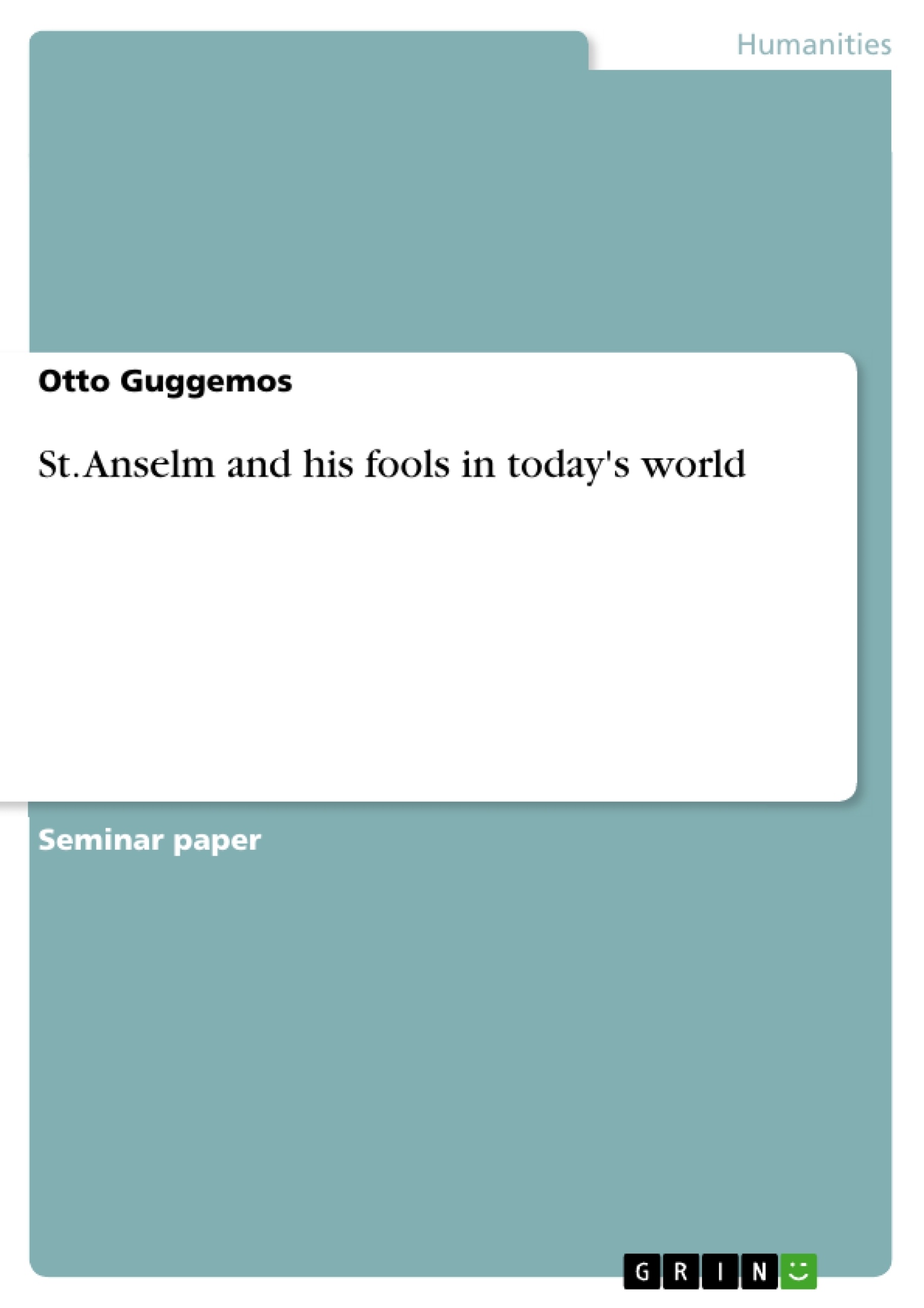Not long ago, I met with some friends, Christians and non-Christians, for a philosophy
discussion. We discussed Anselm of Canterbury's ontological argument for the existence of
God. None of us was convinced that Anselm's proof was valid. In the beginning of the
evening, we agreed with Schopenhauer who called Anselm's argument a "charming joke,_
but we went on talking and found ourselves challenged by Anselm's argument. It triggered a
discussion that clarified various issues of our thoughts. This paper will be an investigation of
the implications of Anselm's argument in the context of the contemporary western world -- an
investigation of the multiple tangents from Anselm's philosophy to the streams of the popular
mindsets of our time.
Anselm (1033/4-1109), archbishop of Canterbury, lived in a time when many people felt that
philosophical method possessed an intellectual respectability which theology lacked. Some
theologians called Dialectics, like Anselm, started to apply philosophical dialectic and logic
to theological issues. The question of the time was how the independence of philosophy
could be reconciled with the Catholic position. In 1072, Peter Damian defined philosophy as ancilla dominae (maid of the Lord). Among the Dialectics, Anselm belonged to the group
of the Realists.
About 1070 he started his writing career. His most important works are Proslogium,
Monologium, and Cur Deus homo. Although calling Anselm the "father of Scholasticism_
might be an exaggeration, he set the trend in theology and philosophy for the following
centuries by explaining the Christian faith in a rational, logical system. In the 12th century,
the Roman Catholic Church made him a saint, and in the 18th called him doctor ecclesiae.
Anselm became best known for the ontological argument for the existence of God which he
first formulated in the Proslogium. It goes as follows: God, Anselm defines, is the "being
than which nothing greater can be conceived._ Since existence in reality is greater than
existence in understanding alone, i.,q.n.m.c.p.11 existing in reality is greater than i.,q.n.m.c.p.
not existing in reality. Hence, if i.,q.n.m.c.p. existed not in reality, it were not i.,q.n.m.c.p.,
for something greater than it could be conceived. This is an absurd contradiction in itself:
"certe hoc esse non potest." [...]
Inhaltsverzeichnis (Table of Contents)
- Introduction
- A Post-Modern Proof
- Definitions of 'God' and Reality
Zielsetzung und Themenschwerpunkte (Objectives and Key Themes)
This paper investigates the implications of Anselm's ontological argument for God's existence within the context of the contemporary Western world, exploring the connections between Anselm's philosophy and prevalent modern mindsets.
- Anselm's ontological argument and its validity in modern thought.
- The concept of "foolishness" in relation to belief and understanding.
- The interplay between faith, reason, and empirical evidence.
- The relationship between language, reality, and metaphysics.
- The evolving understanding of "reality" in contemporary society.
Zusammenfassung der Kapitel (Chapter Summaries)
Introduction: This chapter introduces Anselm's ontological argument and its reception among the author's friends. It sets the stage for an exploration of the argument's relevance to contemporary thought.
A Post-Modern Proof: This section discusses the common modern belief that God's existence cannot be proven, contrasting it with Anselm's perspective. It explores the concept of different frames of reference and the role of faith in understanding.
Definitions of 'God' and Reality: This chapter delves into the ambiguity of "reality" in modern society, contrasting it with Anselm's scholastic understanding of existence (in intellectu and in re).
Schlüsselwörter (Keywords)
Anselm, ontological argument, God, faith, reason, foolishness, postmodernism, reality, hermeneutic circle, Realism, language, metaphysics.
- Quote paper
- Otto Guggemos (Author), 1998, St. Anselm and his fools in today's world, Munich, GRIN Verlag, https://www.grin.com/document/108849



